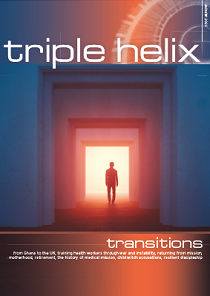John Dunlop MD
- Crossway, 2017, £10, 208pp, ISBN: 9781433552090
- Reviewed by Ruth Eardley, a GP in Market Harborough and a member of the Triple Helix editorial committee
Dementia, dignity, and honouring God. How these three unlikely bedfellows are not mutually exclusive but, in God's economy, entirely harmonious, is this book's main theme. As an experienced geriatrician, John Dunlop knows his subject and illustrates his points with clinical histories. He is also grounded in medical ethics and both his parents had dementia.
Although written for a lay readership, medics will recognise the scenarios and 'the good, the bad, and the ugly' in terms of symptomatology. The author lays biblical foundations for understanding the tragedy of suffering, considers diagnoses, treatment, and what dementia feels like for both patient and caregiver. His exploration of inherent, made-in-the-image-of-God dignity is a challenge to societal ideas of 'worth' and chapter eight (How Can We Honour God through Dementia?) is the highlight of the book; so good I read it twice.
There is a useful index and I particularly liked the short prayers at the end of each chapter. They are straightforward, honest, 'pray-able' prayers that beautifully condense our bewilderment and pain. There is an American bias, as you would expect, but the stories are universal. The approach is direct, kind, realistic, and reassuring. Above all the author is confident in God's sustaining grace and the ability to discern his image, even when dementia ravages those we love.
Highly recommended.
Dennis Burkitt: A Cancer, the Virus, and the Prevention of Man-Made Diseases
John H. Cummings
- Springer, 2022, £35, 437pp, ISBN: 9783030885625
- Reviewed by David Cranston, an Associate Professor of Surgery at the University of Oxford, and an Honorary Consultant Urological Surgeon at the Oxford University Hospitals Foundation Trust.
Denis Burkitt is a name known universally not only for the lymphoma that bears his name but also for his work on dietary fibre and Western diseases. A committed Christian, he was a lay reader in the Church of England and President of the Christian Medical Fellowship in 1967. On the one hand, this is the most comprehensive biography of Burkitt published to date, while on the other, it reads like a detective novel tracing the search for the cause of Burkitt's lymphoma.
Written with the full support of his family, the book takes excerpts from his personal diaries and family archives as it follows his journey from his evangelical, Irish Protestant roots, to the Colonial medical service in Uganda. It also speaks poignantly of the cost to his wife, Olive, and relates her repeated bouts of depression.
During his two decades in Uganda, the book traces the way some of Burkitt's strict views (no alcohol, cinema, theatre, or dancing) were modified under the influence of his wife. He was able to qualify as a surgeon, despite the loss of one eye at the age of eleven, and often said that God gave him the ability to see with one eye what many had failed to see with two.
Never one for spending money unnecessarily, he would usually travel economy when flying, and did not enjoy the social functions that he had to attend in Uganda as a Colonial Surgeon and even less the bigger events as his fame spread. But he was a man who always gave credit to others for the work they did.
At ease with royalty or students, humble and gracious in his demeanour the book paints a picture of an internationally respected, deeply Christian man who only on rare occasions let pride get the better of him, and who always felt that the fellowship of Christian believers meant more to him than the Fellowship of the Royal Society.
Walking with communities
Ian Campbell, Alison Rader Campbell, Robin Rader
- Salvation Books, 2022, £25, 325pp, ISBN: 9781911149859
- Reviewed by Fi McLachlan, Head of CMF Global
'...Not outlining a theory, but is a powerful testimony to the presence of God everywhere and in every situation. How care can lead to lasting hope and change. It describes mission at its best'
These introductory remarks to this beautifully presented, and engaging 'non textbook', do sum up the stories it tells from around the world.
Ian, Alison, and Robin recount a listening and appreciative approach to integrated mission. As healthcare workers, seeing the relevance and need to engage communities in addressing their own issues, their aim is to engage and provoke anyone on the journey of integrated mission.
The book outlines an approach called SALT - exploring stories, an appreciative (rather than deficit) mindset, learning by listening and transferring vision. We see examples of where this approach has enabled communities to grow and be transformed.
The authors exemplify principles such as the need to be genuinely caring to achieve sustained change, the importance of creating safe spaces for openness and shared confidentiality, or that the organisation is more than the structure, amongst others.
The book has a somewhat complex structure, mapping a wonderful walk on the South West Coastal Path in the UK onto memories of seeing God's healing grace at work in lives and communities around the world. The book also lists helpful reflective questions at the end of each section to enhance our recognition of where God is at work in some of the situations in which we are engaged.
If you wish to delve into stories of God at work across his world, with fitting examples and beautifully illustrated with photographs, and if you are willing to be provoked into thinking about the broader aspects of healthcare and how we walk alongside those we serve, then this book is a good buy!































